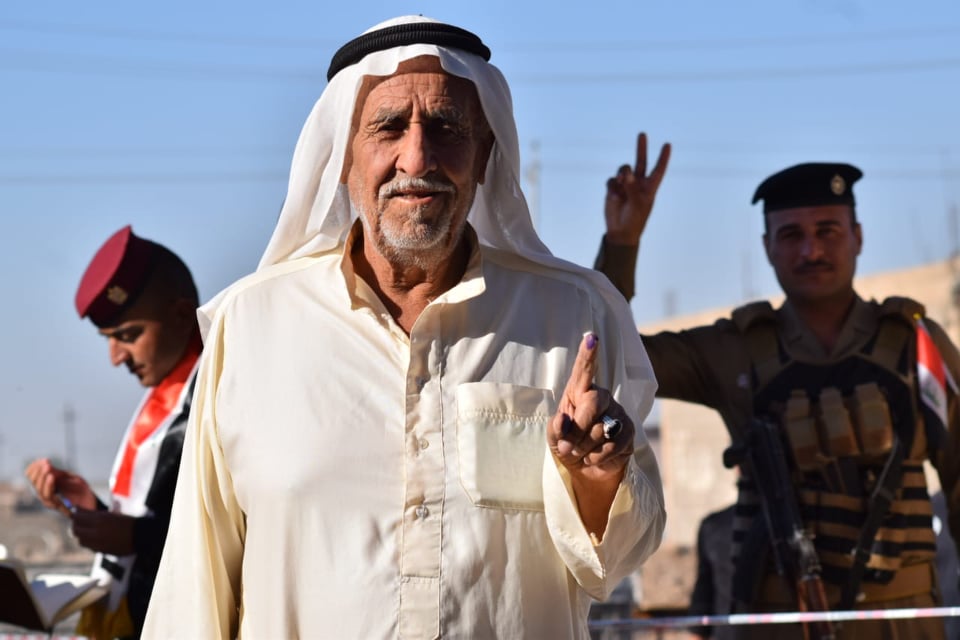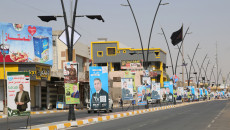Three political entities complain to the electoral commission in Kirkuk describing the elections as flawed and calling for manual count and sort, a matter the electoral commission finds normal.
One of the political parties in Kirkuk representing the Arab community, and another elected by the Turkmens and a key Shiite faction which received a big blow have complained to the Independent High Electoral Commission in Iraq IHEC without providing concrete proofs.
The low turnout was a big signal that the Iraqi people have lost trust in the current political parties ruling Iraq since the ousting of Saddam Hussein regime in 2003. Iraqi Turkmen Front ITF, which has won two seats, Unified Arab Front UAF which as failed to win any seats and al-Fatih Alliance led by Hadi al-Amiri, ask for manual sort and counting following the announcement of the final preliminary yet not confirmed results.
Jawdat Zalal, head of elections for ITF, said heir nominees did well in two of third constituencies of Kirkuk “but we still have some doubts so asked the IHEC to manually count and sort votes in the first and second electoral districts.”
“The problem with fingerprints was another issue as in each station minimum 23 people could not vote.”
The electoral commission was using electronic devices to match the electronic cars with fingerprints of the holders.
Back in 2018, the Turkmens and Arabs each have got each three seats of the 12 parliamentary seats of Kirkuk and the rest six has gone to the Patriotic Union of Kurdistan PUK, one of the key Kurdish parties and stakeholder of the Iraqi Kurdistan Regional Government KRG.
In October 10th general elections, Turkmens have won two seats in the second constituency of Kirkuk and Arabs have won the three seats of the third district and a seat in the Kurd-predominant first constituency.
Kurdish political parties have won fur out of five seats f the first constituency and two seats of the second.
In a press statement on Friday, Security Council members have hailed the technically successful elections. “Members of the security council stressed that any electoral disputes that may arise should be resolved through established legal channels.”
The northern oil-rich city of Kirkuk, located 238 kilometers north of Baghdad, is an ethnically mixed province for 1.6 million Kurds, Sunni and Shiite Arabs, and Turkmen. It has long been at the center of disputed territories between Baghdad and Erbil.
Footage: protestors of al-Fatih in front of Kirkuk administration. KirkukNow
Hundreds of supporters of al-Fatih bloc, led by pro-Iran figure Hadi al-Amiri, took to the streets all over Iraq as they earned only 15 seats compared to 45 in 2018. In Kirkuk, they held a demonstration in front of Kirkuk administration on October 20th.
Iran-backed parties, with links to militia groups accused of killing some of the nearly 600 young protestors in 2019, took a blow, winning less seats than in the last election in 2018.
Abu Jumana al-Zubaidi, a supporter of al-Fatih, said we reject the results of elections “which were opposite to our expectations via peaceful demonstrations.”
“We ask for manual counting and sorting because people believe the results are not true and inaccurate. The turnout by our voters was high and people think their votes were stolen and we want to retain our rights.”
The new electoral law ratified last November, a key demand of demonstrators in 2019, changed each of the country’s 18 provinces into total 83 electoral districts in order to prevent parties from running on unified lists, which has in the past helped them easily take all the seats in a specific province. Instead, the seats would go to whoever gets the most votes in the electoral districts.
The 329-member house of representatives was elected in May 2018. The vote is held every four years, but 2019 protesters have been demanding early elections.
Only 440,000 Kirkukis, about 44%, of more than one million people eligible to vote, cast ballots for 12 seats in the Iraqi parliament, three of it for women plus a seat for the Christian community.
The Arab community had 60 candidates in Kirkuk while Kurds and Turkmens all together have 70 candidates, as all the 130, 56 of them independent, were racing for the 12 seats of Kirkuk distributed over three constituencies.
The UAC said though its president Sheikh Wasfi Assi has got adequate votes and came third yet he had to leave his seat for a woman candidate as per the new electoral law, one seat in each constituency is for women candidates.
"As several women made it to the parliament in the first and second constituency, there was no need to impose a women candidate in the third as well," a statement by UAC said.
Women candidates have occupied four of the 12 seats of Kirkuk, 2 in the second constituency and one on in the first and third.
The UAC argue since three women made it to the parliament, there no need for Assi to leave his seat for a woman per gender quota.
"The quota seats are decided per each constituency not each province," a source in the electoral commission in Kirkuk told KirkukNow anonymously.
Regarding the complaints by some of the Arabs and Turkmen political parties in Kirkuk, the source of Kirkuk office for IHEC said, "there will always be complaints and criticism by those who didn't like the results. Fingerprint problem was all over Iraq."
The source added the head office decides if any station or a whole center to be manually counted and sorted. "The results of random counting and sorting by were identical."
However, on October 22nd the IHEC said in a press release that it has accepted only one complaint out of 295 complaints it has received, which is about manual counting of several polling stations of Kirkuk as "adequate proofs were provided."






